December 10, 2015
By Giang Nguyễn
Myanmar’s democracy movement may still have a long road ahead but Vietnamese opposition groups are already parsing the lessons from its political transition to inform their own goal of a democratic Việt Nam.
Fourteen Vietnamese democracy activists, human rights defenders and citizen journalists met with Burmese civil society groups including the Democratic Voice of Burma, the Assistance Association for Political Prisoners, and the National League for Democracy. Half of the group travelled from various regions of Việt Nam, while the other seven came from the Vietnamese diaspora. Another seven Vietnamese citizens were barred by Vietnamese authorities from leaving the country.
The three-day study tour on the “Lessons from Myanmar,” organized by pro-democracy party Việt Tân, kicked off earlier this week with a special welcome at the headquarters of the National League for Democracy in Yangon.
“We’re very inspired with the achievements of the NLD over the last three decades,” Việt Tân spokesman Duy Hoàng told former General U Tin Oo, NLD’s chairman emeritus, who received the Vietnamese delegation. Tin Oo, together with democracy icon Aung San Suu Kyi, founded the NLD in 1988.
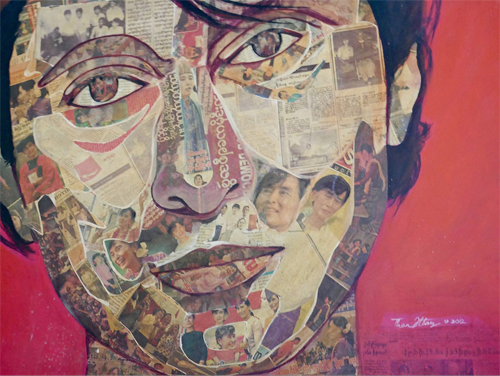
The NLD had been declared illegal by Myanmar’s military junta but was later allowed to register as a political party. The organization won a landslide victory in the November 8 general election that, despite some irregularities, was hailed by the international community and U.S. President Barack Obama as Myanmar’s first free vote in 25 years, marking a milestone in its people’s perilous struggle for democracy and human rights.
General Tin Oo shared with the group that political and economic pressure were a factor in the ruling generals’ recent reforms.
“Another thing is that the support from the democratic countries, especially the United States, the impact of the economic sanction, has very greatly affected them, even though they pretend they are not affected by the imposing of the economic sanctions from the US or the EU.” he said.
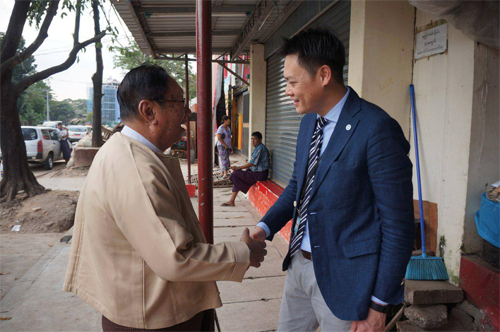
“During the whole period we stood on the principle of human rights and democracy,” NLD spokesman U Nyan Win added. “We asked for democracy and human rights and our main supporters were from the US and EU countries and those people. During the time, most of the ASEAN governments, they did not support us, but most of the opposition in ASEAN, they supported us and we have contact with them.”
During a lively question and answer session, one of the study tour attendees shared with Tin Oo that Vietnamese people rejoiced when they heard news of the NLD’s victory.
But the general responded with a note of caution. “Yes we feel very joyous. But we cannot enjoy yet,” he said. “We foresee many things to overcome, you see. We must be careful and very precisely thinking pragmatically how to carry on, to surpass this position [and] to get out of the security of the state.”
At a roundtable discussion later, co-hosted by Việt Tân and Phandeeyar Myanmar Innovation Lab, representatives from local and international civil society groups echoed this sentiment of cautious optimism, mixed with anxiety about Myanmar’s future.
Zarni, who goes by one name, is a former political prisoner and spent eight years at the torturous Thayawaddy prison.
As a former leader of the pro-democracy 88 Generation Students Group, he told Loa he supported and voted for the NLD this past November.
But, he says, corruption can exist in the government, as in the opposition.
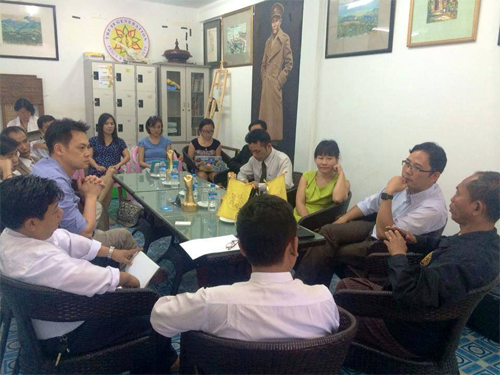
“Most of the civil society organizations, they don’t know their role,” he said. “They dare to fight against the military regime. But they dare not to say they fault the opposition. That will be dangerous for our future.”
“That’s why I have decided not to become a member of the parliament. Because I would like to make [sure there is] check and balance on both sides,” he said.
During the roundtable and throughout the three days, Việt Nam-to-Myanmar participants took away lessons in rallying international support, capacity-building, and organizing – and how those responsibilities can be coordinated between activists in exile and those inside the country.
“When I get back to Việt Nam, I can share my knowledge from here to every member in our organization,” said Trương Quốc Phong, founder of Dân Trí Việt, or People’s Intellect, a group that aims to awaken social consciousness among Việt Nam’s youth. “I can be a bridge between the democracy activists in Burma and those in Việt Nam who were not able or not allowed to come here.”
“What I liked most about our Myanmar friends is that they focused on every segment of the people,” participant Trần Anh Vũ shared.
“In Việt Nam, there is still this limitation in that [our opposition movement] is only focused on the direct victims of the government,” he said, referring to human rights defenders who have faced persecution. “Those indirect victims, those who are suffering or are are silenced, the democracy movement in Việt Nam has not yet focused on.”
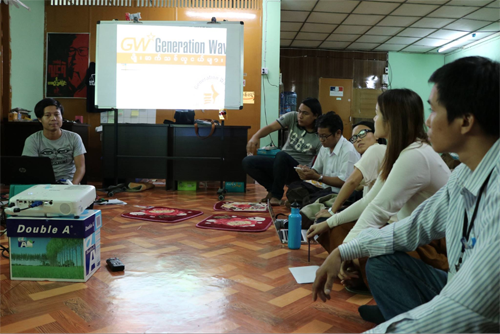
Participants also wrestled with more mundane problems: how to overcome apathy and internal divisions within as well as across the many different groups and members of civil society. Billy Ford of Freedom House, a nongovernmental organization that promotes democracy, political freedom, and human rights, saw parallels in both authoritarian countries: “The goal of the Myanmar government was to divide and conquer. To divide human rights defenders along ethnic, along religious lines.”
He said the biggest challenge for opposition groups was how to remain cohesive in order to build the movement. “It’s a really challenging process of trust building, maintaining relationships despite distance,” he said, referring to exile and domestic groups. “That element of trust, which sometimes when I interact with Vietnamese human rights defenders, I hear that is a big challenge. The lack of ability to communicate across the country causes some distrust and misunderstanding, which is in some ways an intentional motivation by the government.”
The study tour also compared notes on Vietnamese and Burmese opposition movements with Generation Wave, a group which was part of an underground political network both inside and outside Burma, and Myanmar Egress, a nonprofit organization founded by Myanmar scholars and social workers.
At the offices of the 88 Generation Students group, prominent activist Ko Ko Gyi, who was among the student leaders that spearheaded the people power uprising in 1988, told Loa what motivated him to keep fighting after three decades in and out of prison. He spent over 17 years in prison on multiple occasions. His resolve and fighting spirit continues to this day; he has said that he will set up his own political party.
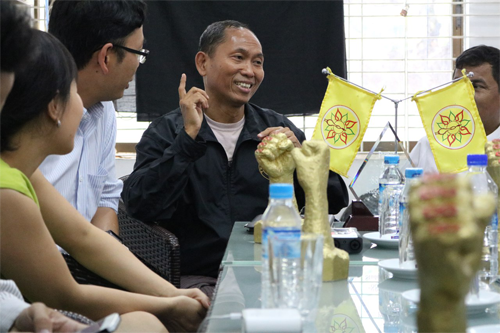
“We changed our country without violence,” he said.
When asked whether he would want to live a simpler life, he answered: “I don’t want to be a simple man.”
It was a simple resolution for these difficult times and a lesson in resolve for the Vietnamese students of change.
Source: Loa





